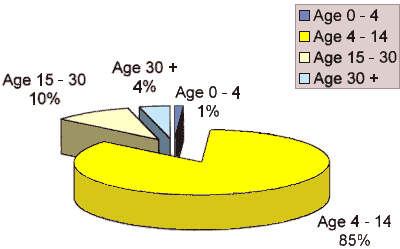At what age do Americans become Christian?
TL;DR:
Research from the Church of the Nazarene, Barna Group, and others shows that most Americans (around 83%) make their initial faith commitment to Jesus before age 18.
Many lifelong Christians and even missionaries first sensed God’s call during these formative years. While adulthood conversions do occur — often prompted by major life transitions such as marriage, parenthood, or crisis — they are less common. Bottom line: The best opportunity for evangelistic impact in America is during childhood and early adolescence.
Evangelism statistics: How old are people when they get saved?
- Data from several surveys points to the ages at which
Americans typically become Christians.
- According to surveys, a large portion of American Christians
(83%) made their initial commitment to Jesus as children and early youth.
- The probability of an American becoming a Christ-follower decreases with age.
"I have been reminded of your sincere faith, which first lived in your grandmother Lois
and in your mother Eunice and, I am persuaded, now lives in you also." -- 2 Timothy
1:5
Ages at which Americans say they initially placed their belief and faith in Jesus of
Nazareth as the promised Messiah and became evangelical, born-again Christians

The data in the pie graph or chart comes from research done at the Global
Ministry Center of the Church of the Nazarene.
Another survey cited by the International Bible Society indicated that 83% of Christians make their first commitment to Jesus between the
ages of 4 and 14 when they are children or early youth. Surveys done by the Barna Research Group indicate
that American children aged 5 to 13 have a 32% probability of accepting Christ, while the
probability of youth aged 14 to 18 becoming Christians falls to 14%. Unbelieving adults ages 19
and over have just a 6% probability of becoming Christians.
This data illustrates the importance of influencing children to consider following Christ and welcoming Him as Savior and Lord.
Because the 4-14 age period slice of the pie is so large, many have started talking about a
"4-14 Window." Many people serving as career cross-cultural missionaries have testified that
they first felt God calling them to missionary service during that 4-14 age period.
Jesus said, "Let the little children come to me, and do not hinder them, for the kingdom
of heaven belongs to such as these." -- Matthew 19:14
How do you start a conversation in which you talk about your own spiritual pilgrimage and
of the divine invitation for us to put our trust in Jesus of Nazareth as Savior and Lord?
-- Howard Culbertson, hculbert@snu.edu
Afterword -- Other Studies
The results of studies looking at the age at which Americans become Christians vary
depending on the denomination, religious background, and specific criteria used. However, some
general patterns have been observed in surveys and research on religious conversion and
affiliation.
- Childhood and Early Adolescence: The majority of
Americans who identify as Christians report becoming Christians at a young age, often before the
age of 18. According to data from various studies such as the Barna Group and Pew Research, many
people in the U.S. report adopting or confirming their Christian faith during childhood or early
adolescence.
Barna Group's research has indicated that nearly two-thirds of people in the USA who identify as Christians
made their commitment to Christ before the age of 18. A substantial portion (about 43%) become Christians before age 13.
- Late Teens and Early 20s: Another key period for conversion or deepening faith is during the late teens and early adulthood, particularly around the ages of 18 to 25. This is a time when many young people go through life changes, such as leaving home for college or work. Those life changes can lead them to examine or reaffirm their faith.
About 20-25% of Christians report making a faith commitment during this stage of life.
- Adulthood: While the majority of conversions to Christianity happen in childhood and youth, some people adopt or return to Christianity in adulthood. Some people experience life events such as marriage, the birth of children, or
crises that lead them to become more religious later in life.
Around 10-15% of American Christians report coming to faith after age 30.
Bottom Line: The most common time for Americans to become Christians is well before the age of 18. A smaller percentage convert or deepen their faith in late teens, early adulthood or later in life.
Reflecction Questions: Data About the Age of Christian Conversion in USA
- What challenges or barriers might make it harder for American adults to embrace faith in Christ compared to children or teenagers?
- Why do you think young children and pre-teens are often receptive to sensing a call to vocational ministry? How can churches and parents nurture and affirm such callings at an early age?
- How significant is the role of family in shaping a child's spiritual journey? What can families do to create an environment where children are more likely to place their faith in Christ?
- What evangelistic strategies could be effective in reaching adults who have a lower probability of conversion?
- How might life events, such as crises or major transitions, open the door for faith conversations with adults?
You might also like these
More recommended links
